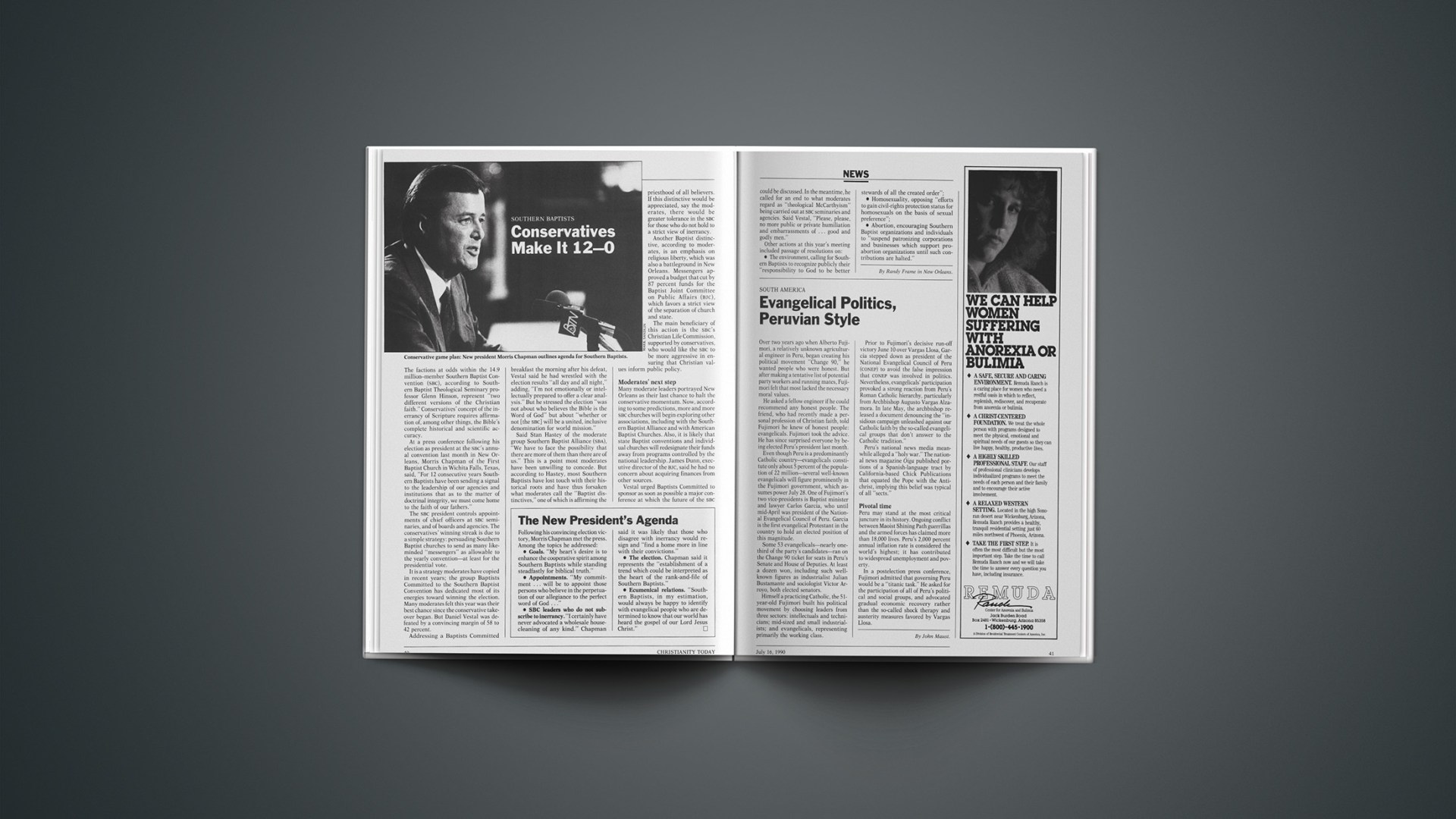The factions at odds within the 14.9 million-member Southern Baptist Convention (SBC), according to Southern Baptist Theological Seminary professor Glenn Hinson, represent “two different versions of the Christian faith.” Conservatives’ concept of the inerrancy of Scripture requires affirmation of, among other things, the Bible’s complete historical and scientific accuracy.
At a press conference following his election as president at the SBC’s annual convention last month in New Orleans, Morris Chapman of the First Baptist Church in Wichita Falls, Texas, said, “For 12 consecutive years Southern Baptists have been sending a signal to the leadership of our agencies and institutions that as to the matter of doctrinal integrity, we must come home to the faith of our fathers.”
The SBC president controls appointments of chief officers at SBC seminaries, and of boards and agencies. The conservatives’ winning streak is due to a simple strategy: persuading Southern Baptist churches to send as many like-minded “messengers” as allowable to the yearly convention—at least for the presidential vote.
It is a strategy moderates have copied in recent years; the group Baptists Committed to the Southern Baptist Convention has dedicated most of its energies toward winning the election. Many moderates felt this year was their best chance since the conservative takeover began. But Daniel Vestal was defeated by a convincing margin of 58 to 42 percent.
Addressing a Baptists Committed breakfast the morning after his defeat, Vestal said he had wrestled with the election results “all day and all night,” adding, “I’m not emotionally or intellectually prepared to offer a clear analysis.” But he stressed the election “was not about who believes the Bible is the Word of God” but about “whether or not [the SBC] will be a united, inclusive denomination for world mission.”
Said Stan Hastey of the moderate group Southern Baptist Alliance (SBA), “We have to face the possibility that there are more of them than there are of us.” This is a point most moderates have been unwilling to concede. But according to Hastey, most Southern Baptists have lost touch with their historical roots and have thus forsaken what moderates call the “Baptist distinctives,” one of which is affirming the priesthood of all believers. If this distinctive would be appreciated, say the moderates, there would be greater tolerance in the SBC for those who do not hold to a strict view of inerrancy.
Another Baptist distinctive, according to moderates, is an emphasis on religious liberty, which was also a battleground in New Orleans. Messengers approved a budget that cut by 87 percent funds for the Baptist Joint Committee on Public Affairs (BJC), which favors a strict view of the separation of church and state.
The main beneficiary of this action is the SBC’s Christian Life Commission, supported by conservatives, who would like the SBC to be more aggressive in ensuring that Christian values inform public policy.
The New President’s Agenda
Following his convincing election victory, Morris Chapman met the press. Among the topics he addressed:
• Goals. “My heart’s desire is to enhance the cooperative spirit among Southern Baptists while standing steadfastly for biblical truth.”
• Appointments. “My commitment … will be to appoint those persons who believe in the perpetuation of our allegiance to the perfect word of God …”
• SBC leaders who do not subscribe to inerrancy. “I certainly have never advocated a wholesale housecleaning of any kind.” Chapman said it was likely that those who disagree with inerrancy would resign and “find a home more in line with their convictions.”
• The election. Chapman said it represents the “establishment of a trend which could be interpreted as the heart of the rank-and-file of Southern Baptists.”
• Ecumenical relations. “Southern Baptists, in my estimation, would always be happy to identify with evangelical people who are determined to know that our world has heard the gospel of our Lord Jesus Christ.”
Moderates’ Next Step
Many moderate leaders portrayed New Orleans as their last chance to halt the conservative momentum. Now, according to some predictions, more and more SBC churches will begin exploring other associations, including with the Southern Baptist Alliance and with American Baptist Churches. Also, it is likely that state Baptist conventions and individual churches will redesignate their funds away from programs controlled by the national leadership. James Dunn, executive director of the BJC, said he had no concern about acquiring finances from other sources.
Vestal urged Baptists Committed to sponsor as soon as possible a major conference at which the future of the SBCcould be discussed. In the meantime, he called for an end to what moderates regard as “theological McCarthyism” being carried out at SBC seminaries and agencies. Said Vestal, “Please, please, no more public or private humiliation and embarrassments of … good and godly men.”
Other actions at this year’s meeting included passage of resolutions on:
• The environment, calling for Southern Baptists to recognize publicly their “responsibility to God to be better stewards of all the created order”;
• Homosexuality, opposing “efforts to gain civil-rights protection status for homosexuals on the basis of sexual preference”;
• Abortion, encouraging Southern Baptist organizations and individuals to “suspend patronizing corporations and businesses which support proabortion organizations until such contributions are halted.”
By Randy Frame in New Orleans.










